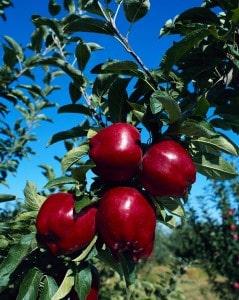 Happy Earth Day!
Happy Earth Day!
These days, we’re more conscious of how our dietary choices affect the health of our planet. But it gets complicated. Sure, buying organic products helps reduce the amount of pesticides and artificial fertilizers that are applied to the ground. But what about the environmental impact of transporting organic produce thousands of miles from its source to your table? How about all the energy it takes to process, package, and transport the organic convenience foods and all-natural junk food that fill the freezers and shelves of high-end whole-foods grocers? And to bring the conversation back to nutrition for a moment, how nutritious do you think those organic sugar-frosted corn flakes really are?
In honor of Earth Day, here are six ways to make your diet healthier for your body and the planet.
- Become a “locavore.” On average, the food we eat travels 1500 miles from its source to our plates, guzzling fuel and spewing CO2 emissions all the way. With more and more organic food being imported from South America (and further!) to meet growing demand, buying organic is not necessarily environmentally friendly. Consistently choosing foods from growers close to where you live can significantly reduce the environmental impact of your diet. To find farms and growers near you, visit LocalHarvest.org
For more on the benefits of supporting our local business, especially during the economic crisis brought on by a global pandemic, see these Buying Local Benefits, Methods, and Tips
- Eat seasonally. When you eat foods that are not in season where you live, they have either been stored from another season or transported from another climate. Both consume energy and degrade the nutritional quality of the food. For the freshest, most flavorful, most economical, and most eco-conscious foods, plan your menus around what is being harvested in your area.To find out what’s in season where you live, see this guide from Foodprint.org
- Eat fewer packaged and processed foods. Even when they are organic or “all-natural,” processed foods consume energy and water, add cost, and create waste at every step of production, packaging, and distribution. To lower your food bill, improve the nutritional quality of your meals, and reduce the negative impact of your diet on the planet, buy whole, unprocessed foods whenever possible.
- Support small farms. Large industrial farms (whether organic or conventional) generally end up cultivating just one or two crops because it is more efficient for them. But a monoculture is tough on the environment, stripping the land of certain nutrients and overloading it with particular waste products. Small farms are more likely to grow a diverse mix of crops and raise a variety of animals, which creates a healthier, more sustainable ecosystem.
- Choose organic. Organic foods preserve healthier soil, air, and groundwater by eliminating or strictly limiting the use of pesticides, drugs, hormones, and artificial fertilizers. Organic practices are healthier for farmers, neighbors of farmers, bees, consumers, and the planet than industrial farming practices. But buying organic is not enough to maintain a healthy environment: Choosing foods that are local, seasonal, unprocessed, and sustainably grown is just as important.
- Eat more meatless meals. Raising animals for meat is very resource intensive. Every meatless meal helps reduce the carbon footprint of your diet. (It’ll also keep your wallet a little greener!) For inspiration, check out Meatless Monday, a movement that’s been catching on in homes, schools, hospitals, and corporate cafeterias around the country.
Finally, in case you think I’m setting the bar unreasonably high, I should say that I still buy foods that are not produced where I live. Although I care about the planet, I’m not ready to give up chocolate, coffee, or olive oil. On the other hand, the artisinal goat cheese they make at Fire Fly Farms, right here in Maryland, is as good as anything flown in from France.
Even if your diet isn’t 100% locally sourced or organically raised, every time you choose a locally-produced food over one shipped from across the country or globe, or a vegetarian meal instead of a meat-based one, you reduce our dependence on fossil fuels and make the air a little cleaner.
To learn more about the environmental impact of your food choices or for help putting these ideas into action, check out these terrific websites:

This is my research paper topic. At roughly 40 TRILLION miles from earth, you can classify this as science fiction. We could never reach it in a million lifetimes.